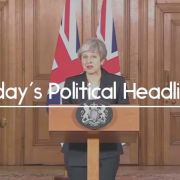Political Headlines – May to be pressed to set departure date and Rees-Mogg apologises for changing his mind
Today’s political headlines includes May to be pressed to set departure date, Rees-Mogg apologises for changing mind over Brexit, Ministers could resign if Government doesn’t allow free votes today and Brexit extension could see UK leave EU in April 2020.
May to be pressed to set departure date
According to The Daily Telegraph, at today’s meeting of the 1922 Committee of backbench Conservative MPs, Theresa May is to be urged to say that she will resign by the autumn. This would lead a number of Brexiteers to withdraw their opposition to her Brexit deal. Speaking at an event organised by the paper, Boris Johnson has hinted that he might reluctantly back the deal if she did so. If she can secure enough backing, a new vote on the deal may be held on Thursday, although Michael Gove has suggested she pick Friday instead.
Rees-Mogg apologises for changing mind over Brexit deal
Writing in the Daily Mail, Jacob Rees-Mogg apologises for changing his mind and backing Theresa May’s Brexit deal, so long as the DUP also back it. He claims that it has become clear that parliamentary numbers mean that ‘all the other potential outcomes are worse’. The paper adds that the European Research Group is likely to split over the deal, with a number of ‘refuseniks’ refusing to back it under any circumstances.
Ministers could resign if Government doesn’t allow free votes today
The Daily Telegraph claims that Theresa May has been warned that up to 20 pro-European junior ministers could resign unless she allows them to vote freely on their preferred Brexit outcomes today, although no Cabinet ministers are expected to quit. The Guardian adds that Jeremy Corbyn is considering whether to back the ‘Common Market 2.0’ proposal in today’s votes, which would keep the UK in the EEA and EFTA.
Brexit extension could see UK leave EU in April 2020
The Guardian reveals that the EU is to suggest a revised Brexit date of 1 April 2020 should the UK request a longer Brexit extension in the coming weeks. The date is contained in papers prepared for use should May have opted to request a longer extension at last week’s European Council summit.
Cameron tells ministers to push for soft Brexit
The Sun claims that former Prime Minister David Cameron has been privately critical to ministers over Theresa May’s failure to pursue a cross-party Brexit compromise, urging remainer MPs to force her to back a customs union with the EU. He apparently told one MP that May would always ‘put the party’s interest first’.
Automatic speed limiters to be fitted to all new cars
The Times says that new measures adopted by the European Commission will mean that all new cars sold in the EU must be fitted with automatic speed limiting and emergency braking technology within the next three years. The Government has pledged that British vehicle standards will be aligned with those of the EU after Brexit.
Government refuses to rethink ‘loan charge’ policy
The Financial Times says that Government has refused to rethink its ‘loan charge’ policy, which will see at least 50,000 people who used loan-based tax avoidance schemes taxed in a single financial year on income on loans they received up to two decades ago, leaving them with bills of up to six figures which they say they cannot pay. Sir Ed Davey, chair of the Loan Charge All-Party Parliamentary Group, said this ‘offends against the rule of law’.
Tory MP criticised after using antisemitic term
The Guardian says that former Brexit minister Suella Braverman has been criticised by the Board of Deputies of British Jews after she used the term ‘cultural Marxism’, often linked to antisemitic conspiracy theories, in a speech. Questioned afterwards, the Conservative MP said that she stood by her use of the phrase, despite its far-right connotations.
When will the UK exit the EU? Stay up to date with Vuelio Political Services.





















